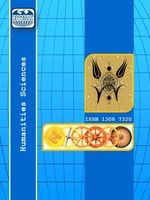A CONTRAST ANALYSIS OF LANGUAGE LEARNING AND VOCABULARY LEARNING STRATEGIES USED BY GERMAN LANGUAGE AND ENGLISH LANGUAGE LEARNERS
Language Learning Strategies, Vocabulary Learning Strategies, Language Teaching/learning, Proficiency, Autonomy,
ALMAN DİLİ VE İNGİLİZ DİLİ BÖLÜMÜ ÖĞRETMEN ADAYLARININ DİL VE KELİME ÖĞRENME STRATEJİLERİNİ KULLLANIMLARININ KARŞILAŞTIRILMASI
Dil Öğrenme Stratejileri, Kelime Öğrenme Stratejileri, Dil Öğretme/Öğrenme, Yeterlilik, Özerklik, ,
___
- Anderson, R.C. and Freebody, P., (1981). Vocabulary Knowledge. In J. T. Guthrie (Ed.), Comprehension and teaching: Research Reviews (pp. 77-117). Newark, DE: International Reading Association.
- Benson, P., (2003). Learner Autonomy in the Classroom. In D. Nunan (ed.), Practical English Language Teaching. New York: McGraw Hill, 289–308.
- Gardner, R., and MacIntyre, P., (1993). A student’s Contributions to Second-Language Learning. Part II: Affective Variables. Language Teaching 26. Cambridge: Cambridge University Press. DOI: 10.1017/S0261444800000045, P: 1-11.
- Goulden, R., Nation, P., and Read, J., (1990). How Large a Receptive Vocabulary Be? Applied Linguistics. 11, 4: 341-63.
- Holec, H., (1981).Autonomy and Foreign Language Learning. Oxford: Pergamon Press for the Council of Europe.
- Huckin, T. and Bloch, J., (1993). Strategies for Inferring Word- meanings in Context: A Cognitive Model. In T. Huckin and M. Haynes (eds.), Second Language Reading and Vocabulary Learning (pp. 153-178). Norwood, NJ: Ablex Publishing Corporation.
- Little, D., (1991). Learner Autonomy I: Definitions, Issues, and Problems. Dublin: Authentik.
- McCarthy, M.J., (1990). Vocabulary. Oxford: Oxford University Press.
- Meara, P., (1980). Vocabulary Acquisition: A Neglected Aspect of Language Learning. Language Teaching and Linguistics: Abstracts 13. DOI: 10.1017/S0261444800008879, P: 221-246.
- Melka, F., (1997). Receptive vs. Productive Aspects of Vocabulary. In N. Schmitt and M. McCarthy (Eds.), Vocabulary: Description, Acquisition and Pedagogy (pp. 84-102). Cambridge, UK: Cambridge University Press.
- Nagy, W.E. and Herman, P.A., (1987). Breadth and Depth of Vocabulary Knowledge: Implications for Acquisition and Instruction. In M. G. McKeown and M. E. Curtis (Eds.), The Nature of Vocabulary Acquisition (pp. 19-51). Hillsdale, NJ: Erlbaum.
- Omaggio, A., (1978). Successful Language Learners: What Do We Know about Them? ERIC / CLL News Bulletin, May, 2-3.
- O'Malley, J.M. and Chamot, A.U., (1990). Learning Strategies in Second Language Acquisition. Cambridge, U.K.: Cambridge University Press.
- Oxford, R.L., (1989). Use of language Learning Strategies: A Synthesis of Studies with Implications for Strategy Training. System, 17/2. DOI: 10.1016/0346-251X (89)90036-5, P: 235-247.
- Oxford, R.L., (1990). Language Learning Strategies: What Every Teacher Should Know. Boston: Heinle and Heinle.
- Schmitt, N., (1997). Vocabulary Learning Strategies. In Schmitt, N., and McCarthy, M. Vocabulary: Description, Acquisition and Pedagogy. Cambridge: Cambridge University Press.
- Read, J., (2000). Assessing Vocabulary. Cambridge: Cambridge University Press.
- Webb, S., (2005). Receptive and Productive Vocabulary Learning: The Effects of Reading and Writing on Word Knowledge. SSLA. 27. DOI: 10.1017/S0272263105050023, P: 33-52.
- Wenden, A., (1998). Learner Strategies for Learner Autonomy. Great Britain: Prentice Hall.
- Başlangıç: 2009
- Yayıncı: E-Journal of New World Sciences Academy
TURİZM İŞLETMECİLİĞİ VE OTELCİLİK PROGRAMLARINDAKİ MESLEKİ ALMANCA DERSLERİ ÜZERİNE BİR ARAŞTIRMA
TÜRK GAZETECİLERİN HABER YAYINLAMA KRİTERLERİNE YÖNELİK BİR ARAŞTIRMA
Mehmet Sezai TÜRK, Ahmet BIYIK, Ahmet GÜVEN, Ayşe İŞİ
Zeynep YAPRAK, Fatma HAYTA, İbrahim Halil YAPRAK
RADYONUN MÜZİK KUTUSUNA DÖNÜŞÜMÜ: RADYO PROGRAM TÜRLERİ ve TERCİH EDİLİRLİK ORANLARI
